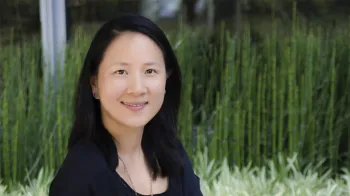Submitted on May 19, 2020

Nadia Roan, PhD, an Associate Professor of Urology at UCSF who has been studying immune responses to HIV for almost 15 years, has recently shifted her focus to COVID-19 research efforts. She, together with Sulggi Lee, MD PhD, Joshua Vasquez, MD, and Eliver Ghosn, PhD, have assembled a team with expertise in virology, immunology, pulmonology, genomics, and clinical research design to understand what constitutes effective immune-mediated clearance of SARS-CoV-2, the virus that causes COVID-19.
“One highly puzzling aspect of COVID-19 is why some individuals exhibit much more severe disease than others,” says Dr. Roan. She noted that although advanced age and pre-existing health conditions are known to increase risk of severe disease, exactly how they do so is not well understood, and on top of that, there are clear exceptions to these risk factors, e.g., young individuals without pre-existing individuals in the ICU as a result of COVID-19.
She floated these observations to Raj S. Pruthi, MD, MHA, FACS, Professor, Department of Urology and to Peter R. Carroll, MD, MPH. Dr. Carroll was able to help secure philanthropic funding from some of the Department’s generous donors including the Van Auken Private Foundation and David Henke. These gifts, along with a grant from the Program for Breakthrough Biomedical Research at UCSF have enabled Roan and her team of scientists and clinicians to begin their COVID-19 studies.
“Although it is highly unusual for a Department of Urology to have an investigator studying infectious diseases on its faculty, we recognized Dr. Roan’s extraordinary talent early on. Her team is moving forward immediately and hopes to contribute toward ending this devastating pandemic” explains Dr. Pruthi. “They are well-equipped given their work with other viral pathogens. They already have the necessary experience of conducting research using cutting-edge technologies in a biosafety level 3 laboratory.”
The Van Aukens shared “We have been donors for the last 20 years to UCSF supporting Cancer research and clinical care, but given the frightening pandemic the world now faces from COVID-19, we wanted to find a way to support promising research to defeat this disease. We are so thankful that Dr. Carroll brought the work of Dr. Roan to our attention. She and her team are uniquely impressive and we are hopeful that their work will make a difference in the fight against this terrible virus."
Using samples gathered from COVID-19 patients, the team plans to look at a variety of different immune cells: including T cells, the “helper cells” that are the main targets of HIV; B cells, the cells that produce antibodies; and myeloid cells, important immune effectors that may themselves be infected by SARS-CoV-2. They seek to identify immune features of individuals that elicit the ideal kind of immune response to SARS-CoV-2: that resulting in asymptomatic infection. By comparing longitudinal blood and respiratory specimens from asymptomatic, mildly symptomatic, and severely symptomatic individuals with confirmed COVID-19, the team hopes to identify early biomarkers predicting whether or not someone will later manifest with severe disease, which will be useful as prognostics and help risk-stratify individuals needing care in an overwhelmed healthcare system. By probing the features of T and B cells recognizing SARS-CoV-2 in the different individuals, the team aims to establish a better understanding of effective and detrimental immune responses to the virus, information that will inform the field of vaccine development. In the context of therapeutics, the team plans to identify effective antibodies from asymptomatic / mildly symptomatic cases, which will be cloned for further development.
“This is a very exciting path of research,” says Dr. Pruthi. “The answers to these questions are crucial in the international battle in stopping this pandemic.”